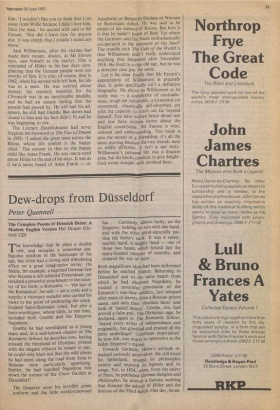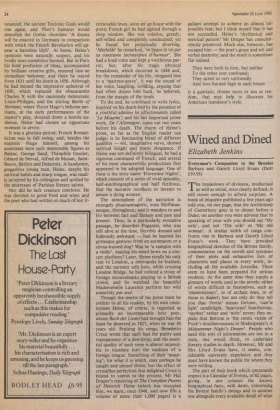Dew-drops from Diisseldorf
Peter Quennell
rr he knowledge that he plays a double role, and occupies a somewhat am- biguous position in the landscape of his age, has often had a strong and stimulating effect on a great imaginative writer. On Heine, for example, a baptised German Jew who became a self-adopted Frenchman, yet retained a powerful attachment to the coun- try of his birth; a Romantic — 'the last of the Romantics', he said — yet a cynic and a sceptic; a visionary socialist who carried his views to the point of embracing the crack- brained Saint-Simonian creed, but also a hero-worshipper, whose idols, at one time, included both Goethe and the Emperor Napoleon.
Goethe he had worshipped as a young man; and, in a well-known chapter of The Romantic School, he describes how, having crossed the threshold of Olympus, primed with the elegant tributes he meant to pay, he could only blurt out that the wild plums he had eaten along the road from Jena to Weimar were particularly appetising. Earlier, he had watched Napoleon ride down the avenue of the Court Garden at Dusseldorf:
The Emperor wore his invisible green uniform and the little world-renowned
hat ... Carelessly, almost lazily, sat the Emperor, holding his rein with one hand, and with the other good-naturedly pat- ting the horse's neck. It was a sunny, marble hand, a mighty hand — one of those two hands which bound fast the many-headed monster of anarchy, and ordered the war of races ..
Both magnificent idols had been dethroned before he reached France. Returning to Dusseldorf and to the same bench from which he had observed Napoleon, he studied a mournful procession of the Emperor's one-time soldiers, just released after years of slavery from a Russian prison camp, and seen their 'desolate faces' and look of 'naked misery'. Goethe, too, had proved a false god. The Olympian sage, he declared, again in The Romantic School, 'feared every writer of independence and originality, but glorified and praised all the petty underlings!' Goethean imperialism' he now felt, was nearly as oppressive as the fallen Emperor's regime.
Towards Germany Heine's attitude re- mained curiously ambivalent. He still loved his fatherland, revered its philosophic writers and enjoyed its legends and its songs. Yet, in 1834, when, from the safety of Paris, he published German Religion and Philosophy, he uttered a famous warning that forecast the advent of Hitler and the horrors of the Third Reich. One day, he an- nounced, the ancient Teutonic Gods would rise again, and Thor's hammer would demolish the Gothic churches: 'A drama will be enacted in Germany in comparison with which the French Revolution will ap- pear a harmless idyll'. At home, Heine's opinions were naturally suspect, and his books were sometimes banned. But in Paris his bold profusion of ideas, accompanied by brilliant creative gifts, ensured him an immediate welcome; and there he stayed from 1831 until his death in 1856. Although he had missed the impressive upheaval of 1830, which replaced the obscurantist Charles X with the cautiously democratic Louis-Philippe, and the stirring Battle of Hernani, where Victor Hugo's belicose par- tisans, at the early performances of the master's play, shouted down a hostile au- dience, Heine had chosen an opportune moment to arrive.
It was a glorious period; French Roman- ticism was in full swing; and, besides the majestic Hugo himself, among his associates were such memorable figures as Balzac, George Sand, Theophile Gautier, Gerard de Nerval, Alfred de Musset, Saint- Beuve, Berlioz and Delacroix. A handsome, gregarious young man, Heine, despite his satirical habits and sharp tongue, was readi- ly accepted by his colleagues and spoiled by the mistresses of Parisian literary salons.
Nor did he lack creature comforts. He was devoted to good food and wine; and the poet who had written so much of lost ir-
retrievable loves, soon set up house with the pretty French girl he had sighted through a shop window. She was volative, greedy, self-willed and completely uneducated; yet he found her perpetually diverting. Mathilde' he remarked, 'm 'egaye la vie par sa constante inconstance d'humeur' . She had a loud voice and kept a vociferous par- rot; but, after his tragic physical breakdown, which occurred in 1848 and, for the remainder of his life, relegated him to a 'mattress-grave', it was the sound of her voice, laughing, scolding, arguing that had often drawn him back, he believed, from the margin of the tomb.
To the end, he continued to write lyrics, inspired on his death-bed by the presence of a youthful admirer he affectionately called 'La Mouche'; and his last important prose work, De l'Allemagne, came out two years before his death. The charm of Heine's prose, so far as the English reader can judge, is its fascinating blend of different qualities — wit, imaginative verve, shrewd satirical insight and poetic eloquence. If Heine was not definitely bilingual, he had a vigorous command of French; and several of his most characteristic productions first appeared in his adopted language. One of these is the story name 'Florentine Nights', which consists of a series of vivid episodes, half-autobiographical and half fictitious, that the narrator recollects or invents to amuse a dying woman.
The atmosphere of the narration is strangely phantasmagoric, even Hoffman- nesque, throughout; and it wanders to and fro between fact and fantasy and past and present. Thus, in a particularly evocative passage, he describes Paganini, who was still alive at the time, horribly dressed and hideously awkward — had he learned his grotesque gestures from an automaton or a circus-trained dog? Was he 'a vampire with a violin', making his weird bows on a con- cert platform? Later, Heine recalls his only visit to London, a metropolis he loathed; and the narrator tells how, while crossing London Bridge, he had noticed a troop of foreign mountebanks playing to a British crowd, and he watched the beautiful Mademoiselle Laurence perform her wild unearthly pas seul.
Though the merits of his prose must be evident to all his readers, by his own coun- trymen Heine, of course, is regarded as primarily an incomparable lyric poet, whose Buch der Lieder had brought him the fame he deserved in 1827, when he was 30 years old. Praising his songs, Benedetto Croce wrote that each had the purity and transparency of a dew-drop; and the essen- tial quality of such verse is almost impossi- ble to translate into the medium of a foreign tongue. Something of their 'mean- ing', for what it is worth, may perhaps be caught and pinned down; but the effect of crystalline perfection that delighted Croce is bound to vanish in the process. Mr Hal Draper's rendering of The Complete Poems of Heinrich Heine (which has occupied him, we learn, since 1948, and now fills a volume of more than 1,000 pages) is a
gallant attempt to achieve an almost im- possible feat; but I think myself that it has not succeeded. Heine's 'rhythmical and metrical pattern' Mr Draper has conscien- tiously preserved. Much else, however, has escaped him — the poet's grace and wit and verbal dexterity; and the result is sometimes flat indeed.
They were both in love, but neither To the other ever confessed; They acted so very unfriendly And love burned high in each breast is a quatrain, chosen more or less at ran- dom, that may help to illustrate his American translator's style.























































 Previous page
Previous page